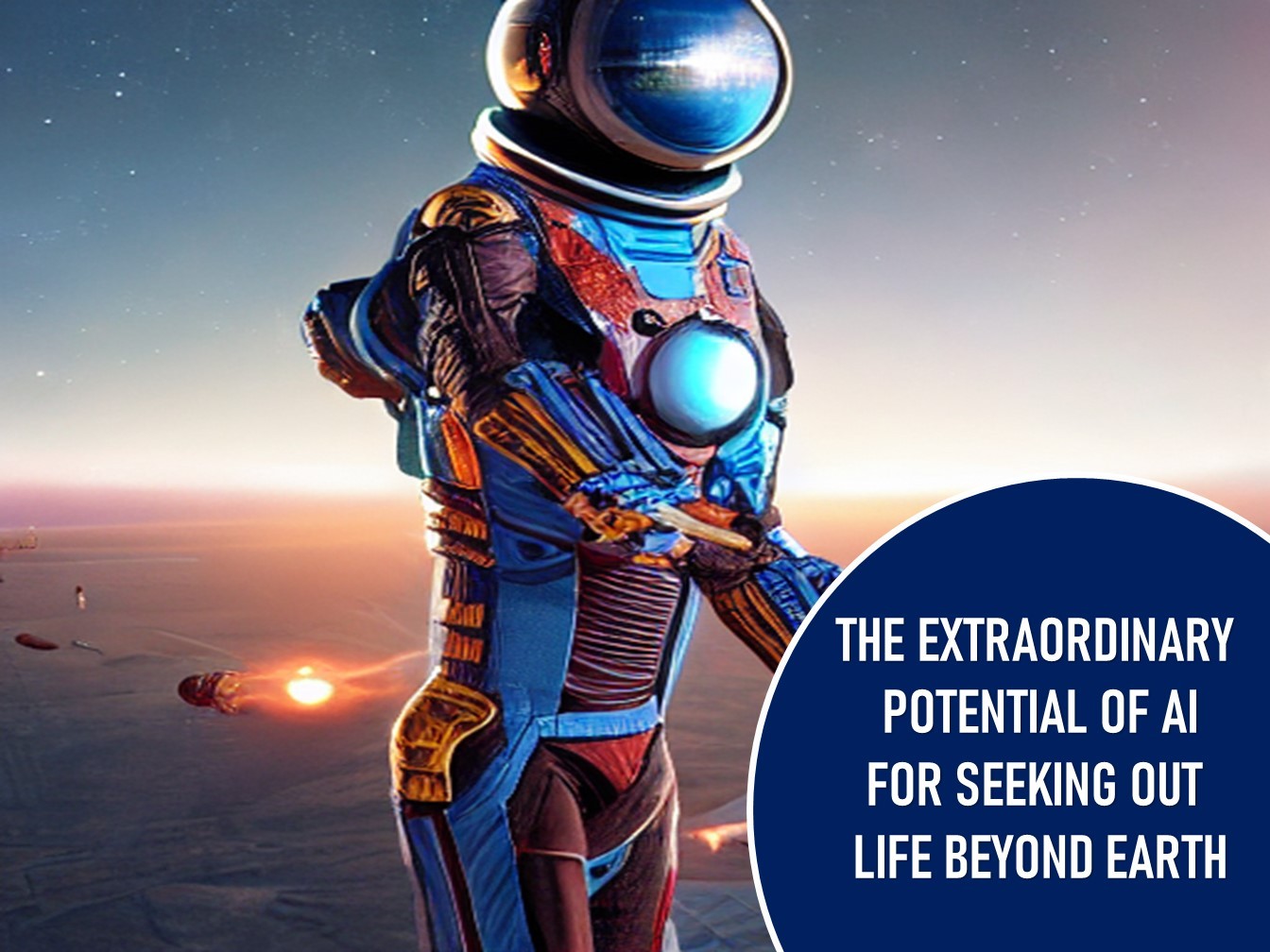No products in the cart.

The Extraordinary Potential Of AI For Seeking Out Life Beyond Earth
Introduction
We have long dreamed of discovering life beyond Earth, but it has proven to be a difficult prospect. Fortunately, the evolution of artificial intelligence (AI) is making the search for extraterrestrial life a more achievable goal. For centuries, humanity has been exploring the possibility of finding life beyond our planet, and AI promises to revolutionize these efforts in ways unimaginable before.
Thanks to AI, we now have the power to search through vast amounts of information faster than ever before. With its ability to analyze data at lightning speed and process complex algorithms with accuracy and precision unmatched by humans, AI is giving us unprecedented access to the universe’s most mysterious corners and may even be capable of identifying signs of extraterrestrial life.
In this article, we’ll take an in-depth look at how AI is revolutionizing our search for life beyond Earth, exploring the potential ramifications and applications for this technology. Ready for a space odyssey? Let’s jump in!
What Discoveries Have Been Made in AI and Alien Life?
Have you ever wondered what kind of incredible discoveries could be made if AI was used to search for alien life? It’s a question that has been on the minds of people for decades.
Recent advances in AI technology and machine learning have opened up possibilities that were once unimaginable. AI can now detect patterns, analyze data faster than any human being, and make predictions that were impossible just a few years ago.
What’s amazing is how quickly AI is evolving in this field. In the last few years, scientists have used AI to discover planets outside of our solar system using images taken by the telescope. It is also being used to search for distant signals originating from exoplanets planets outside our sun which could hold clues of life beyond Earth.
AI can even monitor movements in outer space and detect faint signals from interstellar objects far away from our planet. This could give us astounding insights into the universe and potential new forms of life we’ve never seen before.
What Is the Promise of Machine Learning and AI Algorithms?
You may be wondering how AI might be able to detect intelligence beyond Earth. Fortunately, artificial intelligence and machine learning have already helped us uncover processes and patterns that were once too complex for us to observe on our own.
AI has a great capacity for monitoring things in vast space expanses and processing huge amounts of data in real time. This means that it can rapidly identify areas of interest with more precision than ever before such as exoplanets that could potentially host alien life.
When paired with algorithms, AI becomes even more powerful. Algorithms create models from incoming data which can help filter out extra signals and noise to make the data more useful. In the case of exoplanet-hunting, powerful algorithms are helping AI separate practical planet candidates from nonviable ones. Reducing the time required to search through astronomically large datasets.
By combining the strengths of both AI and algorithms. Scientists are now able to explore deep space at an unprecedented scale in search of new extraterrestrial life forms making what was once thought impossible now within reach.
Could AI Be the Key to Finding Alien Life?
The possibility of AI discovering alien life is a really exciting prospect. And one that many scientists believe is possible but first, it needs the proper tools. And that’s where AI comes in.
AI could be the ideal tool for searching for alien life. It’s incredibly powerful, able to analyze huge amounts of data in an incredibly short amount of time much faster than any human could do it themselves. From processing images from telescopes, sensing patterns in pulsar signals and spotting repeated patterns that could indicate an intelligent source. AI can help us seek out life beyond Earth.
Here are some of the ways AI could be used to find alien life:
- Image Analysis. AI can identify and catalog objects or substances in images or videos faster and more accurately than humans can. Quickly identifying potential signs of alien life in vast amounts of data taken from research telescopes and other sources.
- Signal Analysis. Pulsar signals are similar to a lighthouse beam giving off regular flashes. This makes them good indicators for extraterrestrial intelligence (ETI). AI can help spot patterns in these signals that could indicate ETI activity more quickly than human analysis alone.
- Searching for Patterns. By looking for telltale signs such as periodic transmissions or other repeating signals coming from space that might suggest extraterrestrial civilizations are at work, AI eliminates the need to sift through thousands of false positives manually by filtering out only potential ETI transmissions.
AI offers huge potential when it comes to discovering whether or not we’re alone in the universe and if we’re not, unlocking its secrets to uncover alien life beyond Earth.
What Potential Does AI Have for Uncovering Signs of Alien Life?
When it comes to the extraordinary potential of Artificial Intelligence (AI) for seeking out alien life beyond Earth, you have probably already heard the arguments. After all, AI can rapidly analyze large datasets that humans would struggle with. For example, high-tech AI technology has been used to scan space images and point out unusual signals in the data.
But what potential does AI have for uncovering signs of alien life? The answer is quite a lot. Here are just a few of its possible applications:
- Analyzing and classifying large swathes of astronomical data traditional methods take too much time and resources for humans to process.
- Studying astrophysical phenomena such as exoplanets for signs of atmospheres that could harbor life.
- Automatically inspecting radio and optical signals from outer space for any anomalies.
- Analyzing planetary surfaces in greater detail than ever before.
AI could also be used to help with the search for extrasolar planets or even help provide new insights into dark matter or dark energy. But most importantly, it can revolutionize the way we search for extraterrestrial life – helping us find them faster and more efficiently than ever before!
How Can AI Help in Our Search for Extraterrestrial Life?
As an aspiring space explorer, you may be wondering how AI can help us in our search for extraterrestrial life. Well, AI can do a lot of things to help us out, such as analyzing data with greater speed and accuracy, designing systems for space exploration, and providing more precise navigation for missions.
Analyzing Data
AI can analyze large amounts of data from astronomical sources much faster than a human. That means it can detect patterns in the data that would otherwise be overlooked. This can help narrow down the search for extraterrestrial life and make it more efficient.
Designing Systems
AI is also very useful in designing systems for space exploration, such as autonomous robots or intelligent spacecrafts. These systems can be used to explore different parts of the universe that humans cannot reach due to their physical limitations or the time it would take them to get there.
Precise Navigation
AI can also provide extremely precise navigation systems needed for successful space exploration missions. For example, these systems can be used to calculate the most efficient routes to distant planets or other celestial bodies and detect possible hazards along the way. With AI helping us out, we’ll be able to explore further and faster than ever before!
What Are the Ethics of Artificial Intelligence and Alien Life Exploration?
As you consider the possibility of AI discovering alien life, you may find yourself stopping to consider the ethical implications. We’re talking about a technology that could uncover something that’s been hidden from us for centuries perhaps even longer. So how do we ensure that we’re using AI in a responsible way?
Respectful exploration
For starters, any advanced AI-driven mission should have protocols in place to protect any evidence of life that is found. After all, this is not just an archaeological mission it could involve artifacts or ruins that have been left untouched for thousands of years, which means we need to treat it with respect.
Maintaining Transparency
The mission should also be open and transparent with its decision-making process and approaches. Scientists and engineers involved in this mission should be open to sharing information so that it can be inspected by other experts in the field, and an external party should be brought in to monitor the mission’s progress and provide additional oversight where needed.
The ethics around AI-driven exploration go beyond just respecting what is found we also need to think about potential conflicts that could arise between humans and aliens if or when contact is made. That’s why researchers should take great care when developing the AI algorithms we want an AI system that can handle complex problems but is also able to think with empathy and respect for any new life forms discovered on other planets.
Conclusion
In conclusion, artificial intelligence has the potential to revolutionize how we search for and discover alien life beyond Earth. Its capacity for pattern recognition, data analysis and computer vision gives scientists a powerful tool to not only detect, but also identify, signs of extraterrestrial life. With the help of powerful algorithms and machine learning, AI can automate the process and make it easier to sift through massive amounts of data.
Perhaps, one day soon, AI will help us answer the age-old question: Are we alone in the universe? Until then, we can look to AI not only to help us understand the possibilities of what’s out there but also to give us the best chance of finding answers and life that we’ve never dreamed of.





